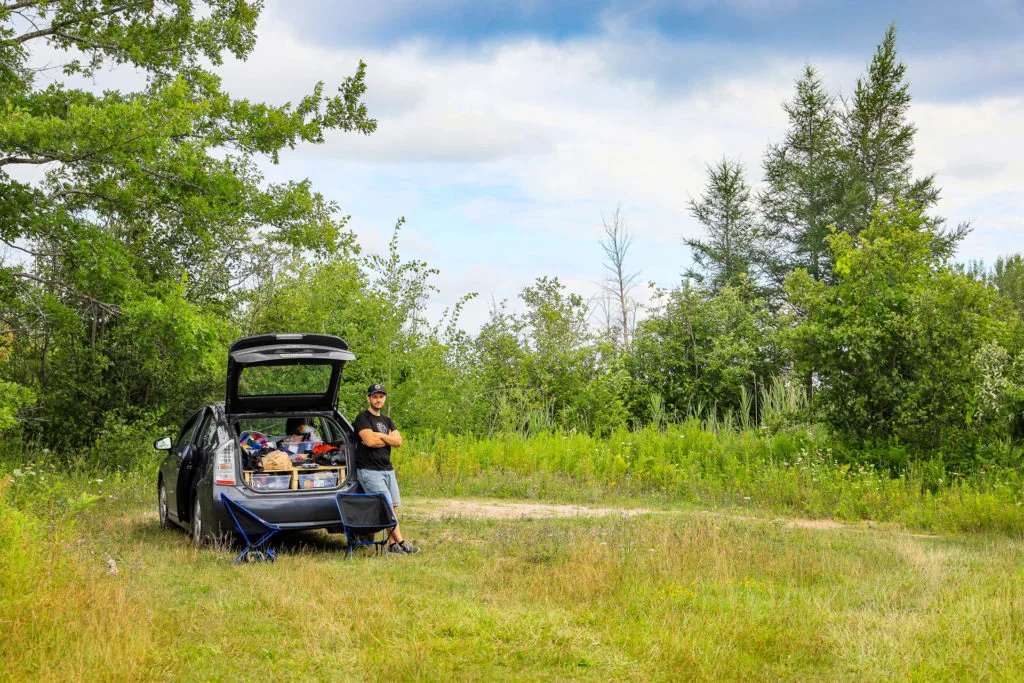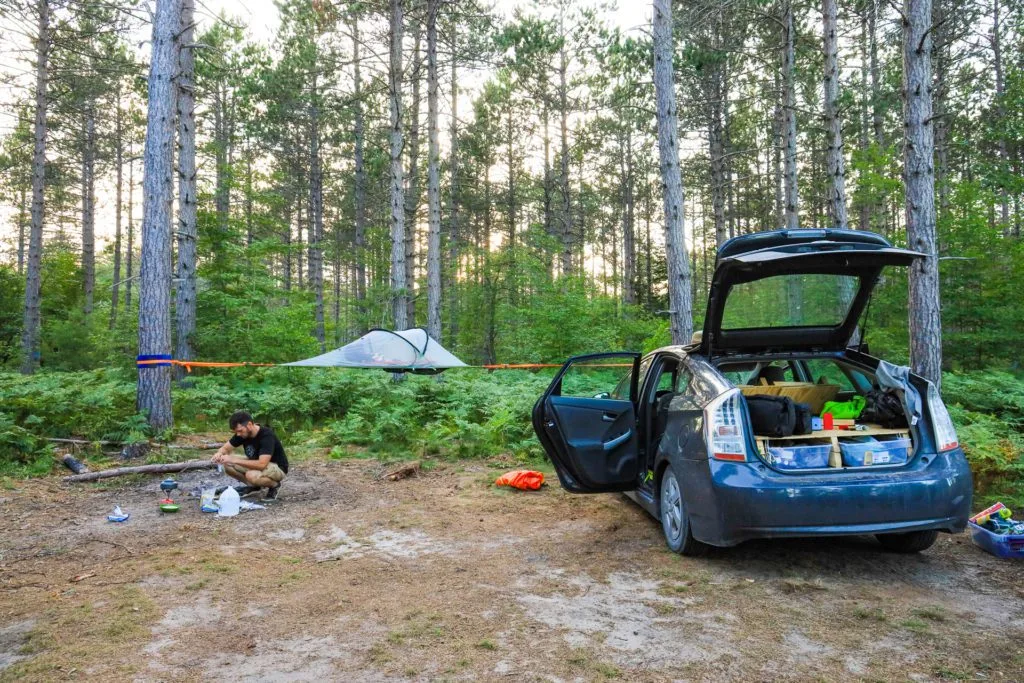The Best Deals on Camping, Backpacking and Outdoor Gear [June 2025]

A lot of travel plans got canceled this year. International travel is largely off-limits and most people aren’t too keen on the idea of flying across the country, either. So naturally, a lot of folks are shifting travel plans to include road trips. And while we can’t in good conscience recommend you embark upon “The Great American Roadtrip” this year, a close-to-home jaunt may be an acceptable alternative (as long as you do it safely and responsibly). But driving across the country or across the state still comes with its own set of complications (even if you don’t require a passport), so we’re gonna break it down. Here’s a solid list of road trip essentials that we’ve compiled based on years of experience (and more than a few flat tires and empty peanut butter jars) and an assumption that you, as we do, will be avoiding crowded hotels in lieu of socially distant campsites this year.
A note about travel during COVID-19: If you’re going to travel across state lines during the pandemic, do your research, plan ahead, and travel safe and smart. Be mindful of travel restrictions from one state to another (some states request that visitors from designated states quarantine after arriving), check the status of the attractions and destinations you want to experience along the way (many are closed), and always have a backup plan for food and lodging. And for the love of all things good and holy, pack some sanitizer and wear a mask (it’s required in many states)!
Road Trip Essentials: The List
- Backup battery. We have a little portable power station like this one that we bought for the road to charge camera batteries and small laptops, but if you’re planning on powering anything that sucks a lot of juice, opt for something like the Goal Zero Yeti 150. You can even get one of their Nomad solar arrays to charge it via the sun! That way, you can always be sure your cell phones/laptops/electric coolers/air mattress pumps always have the power they need to succeed.
- Cooktop and cook set. Chances are, especially if you’re camping, you won’t always be able to grab dinner/lunch/breakfast to go. So bring what you need to feed yourself. We like our backpacking stove, an MSR Pocket Rocket, which takes up practically no space, but for a larger and more economical stove (helpful if you’re feeding more than one or two people or plan to cook a lot), opt for something like the GSI Selkirk 2-burner stove. And don’t forget the cookware! The GSI Pinnacle cook set nestles together beautifully, but any old pots and pans will work. Don’t forget a few canisters of extra fuel!
- Utensils. You know, plates and silverware and things. They’re absolutely a road trip essential if you’ll be eating in the car, the campsite, or ordering takeout. And don’t just stuff your cooler with plasticware! Get some sustainable, reusable utensils like this sweet utensil kit from United By Blue (we love ours and leave a set in the car year-round) or, at the very least, a couple of sporks. A road trip isn’t an excuse to forget about sustainability.
- Hammock. The first thing we do when we park for the night when camping during a road trip is set up the hammock. Because it’s the most comfortable thing ever. We love our Kammok Mantis, but any hammock will do.
- Camp chairs. Don’t think you’ll have a place to hang a hammock? Get some super compact and portable seating like the Helinox Camp One chair. They pack up super small and are comfy, to boot (plus they make great outdoor concert and movie seating).
- Hot spot. If you’re planning to work from the road, a hot spot is invaluable. You can just use your phone’s hot spot of course, but to have more towers available for your web-searching (and campsite- or vegan food-finding) needs, consider a separate hot spot like one from Skyroam.
- An atlas. I feel like this is common sense, but you know what they say about common sense nowadays… An atlas is absolutely a road trip essential. Phones don’t always work. Batteries die. GPS fails. Have a backup. An atlas is just the thing. Plus you can track your course in highlighter to look back at later!
- A good cooler. I suppose any cooler will do, but a good cooler is better. Yeti is the brand to beat. So if you want to keep your hummus and soy milk colder longer, invest in a quality model (that raccoons will also have a harder time getting into than the cheap grocery store brands).
- Travel mugs/water bottles/cups. While during these pandemic days you typically can’t pass a barista your travel mug and tell her to fill it up (some gas stations won’t even let you fill water bottles–you have to fill one of their plastic cups and then transfer it to your water bottle), you should still bring your own vessels. Fill water bottles at clean taps or faucets, make your own coffee and fill your travel mug (my fave is the vacuum-sealed GSI Microlite), and pour ice into a large-mouthed Nalgene to keep the bottom of your cooler from turning into a soupy mess (and then you can drink the water when the ice melts). I also like to have Klean Kanteen straws on hand. You know, for iced coffee…
- A good camping setup. If you’ll be camping instead of hotelling or hostelling (which we assume you will be), you’re definitely gonna need a tent, sleeping bag, and sleeping pad. Which one you choose will depend on what size you want and how much you want to spend. If you want something really fun, check out a Tentsile tree tent (pictured below).
- Water. Especially these days, it’s harder to refill your bottles than you might think. And dispersed campsites (check out our guide to free dispersed camping here) often don’t have spigots. So stock up using a refillable reservoir like the GSI Water Cube. It even collapses when it’s empty to take up less space. It’s invaluable for the campground, too.
- Shower. If you’re into that sort of thing, of course. I can go a week without one depending on the weather, but if you like to stay squeaky clean, opt for something like the Geyser Systems Portable Shower. Or, for less of a whole thing, shower wipes get the job done, too.
- Bug Spray and sunscreen. This should be a given, right? We recommend our favorite DEET-free bug sprays here and our favorite reef-friendly sunscreens here.
- Emergency tools. I’m talking about a jack, a tire iron, and a set of tools so if something goes wrong with your vehicle you don’t immediately have to call a tow truck. We’ve gotten flat tires and been saved by cans of Fix-a-Flat and a portable AC/DC air compressor (side note: tires with a warranty from a national tire supplier chain can really come in handy). We’ve had to replace our car battery in rest stop parking lots. We’ve had to refill coolant reservoirs and change our oil on the road. And having a small tool kit and extra fluids can be a lifesaver.

Other Road Trip Essentials
Naturally, depending on where you’re headed, you’ll need a more targeted list of equipment and supplies besides the above road trip essentials (like towels that double as beach blankets or rechargeable hand warmers), but we figure you’re smart enough to figure out your own packing lists, so go nuts.
And obviously food and water are a necessity. Always have more than you need on hand in case restaurant hours are different than you expected or there aren’t as many grocery stores along your route as you thought. Always have at least a few meals you can eat in your car and plenty of water to drink and cook with.
And because it always bears repeating these days: wear a mask. It’s extra important when visiting new destinations, especially those popular with visitors and tourists. The last thing a small mountain town or beachfront community needs is an outbreak because travelers wanted to get away but weren’t willing to be cautious and respectful. Even if masks aren’t required, be more cautious than you would be at home, at your local grocery store, or your own neighborhood park. So wear one when you pay to fill your gas tank, stop to use a public restroom, stock up on supplies, or pick up your takeout. It’s just the right thing to do.
•
*This post contains affiliate links. That means when you clicky-click and make a purchase, you support Terradrift. Thanks a bunch!
